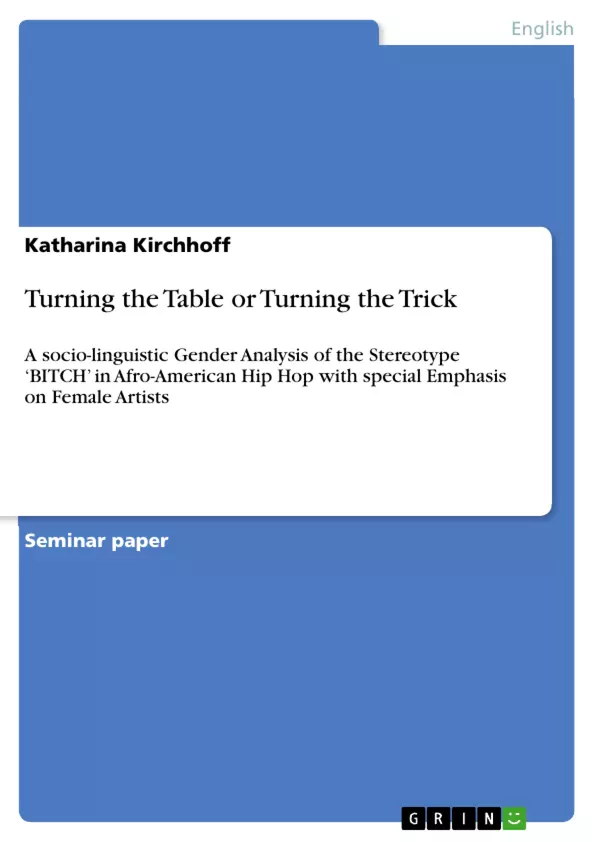The stereotype ‘bitch’ is probably one of the most common female stereotypes used in Hip Hop music. Especially many male artists glorify, justify and thus, normalise the objectification and exploitation of women in their songs and videos. Rap-lines of popular artists like:"Bitches ain't shit but hoes and tricks; Lick on these nuts and suck the dick; Get’s the fuck out after you’re done [...]"(Dogg Bitches Ain’t Shit) reduce women to sex objects and reveal the misogynistic character of Hip Hop music.
In this thesis, I will concentrate on a certain “community of practice” (McConnell-Ginet 71) , which is the Afro-American Hip Hop culture of the United States of America.
Hip Hop evolved out of black cultures (Watkins 9) and was practiced in American ghettos since the 1970’s. Those ghettos were mostly inherited by Afro-Americans and the Hip Hop movement began to rise in this context.
Hip Hop music has undergone major transformations in the last two decades. One of the most significant occurred in the early 1990s with the emergence of Gangsta Rap. The St.James Encyclopedia of Popular Culture identifies Gangsta Rap as the most controversial type of rap music, having received global attention for “its vivid sexist, misogynistic, and homophobic lyrics, as well as its violent depiction of urban ghetto life in America” (Abram, 198).
Due to the rising emancipation and the feminist movements, women are increasingly present and active in all parts of life and so they are in making Hip Hop music. Therefore, the question emerges if the stronger appearance of female Hip Hop musicians challenges the determination of the stereotype ‘bitch’ in Afro-American Hip Hop culture.
Therefore, I will research how the stereotype ‘bitch’ is constructed in Hip Hop culture, with special emphasis on female artists. For this reason, I will combine the fields of Linguistics and Gender Studies.
Table Of Contents
1.) Introduction
2.) Theoretical Aspects
2.1) Gender and Linguistics
2.2) Stereotyping and Labelling
2.3) A Brief History of the Term Bitch
3.) Move Bitch, Get Out the Way! Aggression and Violence Against Women in Afro-American Hip Hop
4.) Who You Calling a Bitch? Resistance Against the Term in the Beginning of Female Hip Hop
5.) I’m the Bonnie to Your Clyde! The Emergence of Female ‘Gangster-Bitches’
6.) You Can’t Tell Me That I Am Not The Baddest Bitch! ‘Bitches’ in Contemporary Female Hip Hop
7.) Conclusion
8.) Works Cited
Frequently Asked Questions
What is the focus of the thesis "Turning the Table or Turning the Trick"?
It researches how the stereotype 'bitch' is constructed in Afro-American Hip Hop culture, specifically focusing on its use by female artists.
How did Gangsta Rap influence the image of women in Hip Hop?
Emerging in the 1990s, Gangsta Rap introduced vivid sexist and misogynistic lyrics that often reduced women to sex objects.
Do female Hip Hop artists challenge the 'bitch' stereotype?
The thesis explores whether the stronger presence of women in Hip Hop resists or reclaims the term 'bitch' to change its meaning.
What fields of study are combined in this research?
The research combines the fields of Linguistics and Gender Studies to analyze stereotyping and labeling.
What does "community of practice" mean in this context?
It refers to the specific Afro-American Hip Hop culture in the United States where these linguistic terms and social identities are practiced.
- Quote paper
- Katharina Kirchhoff (Author), 2012, Turning the Table or Turning the Trick, Munich, GRIN Verlag, https://www.hausarbeiten.de/document/211652


